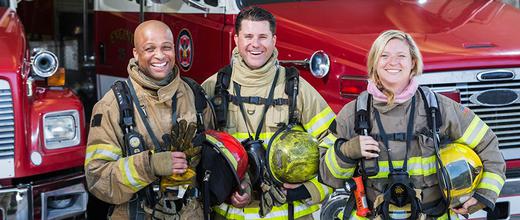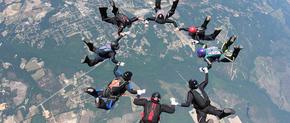The views expressed in our content reflect individual perspectives and do not represent the authoritative views of the Baha'i Faith.
When tragedy strikes, and people run for their lives, look for the people running toward the disaster, and you’ll see the altruistic human spirit made visible.
Those “first responders”—paramedics, firefighters, emergency nurses and physicians, volunteer good samaritans and everyone else who puts their own safety and health at risk to save, protect or help others—truly exemplify the spirit of human kindness and oneness.
Think about it: have you ever seen animals rush to the aid of a wounded fellow animal? Typically, an animal first reacts to danger by fleeing, not by trying to save the wounded or comfort the bereaved. The animal’s first instinct is to save himself. Some people are like that, too, but many others take the opposite path: they naturally and instinctively want to save the lives of others, minimize their suffering and help the ones most in need. They take sacrificial and sometimes life-threatening risks to help people they don’t even know.
The Baha’i teachings point out that extreme difference, and say that a true human being cares first for others:
If man were to care for himself only he would be nothing but an animal, for only the animals are thus egoistic. If you bring a thousand sheep to a well to kill nine hundred and ninety-nine, the one remaining sheep would go on grazing, not thinking of the others and worrying not at all about the lost, never bothering that its own kind had passed away, or had perished or been killed. To look after one’s self only is, therefore, an animal propensity. It is the animal propensity to live solitary and alone. It is the animal proclivity to look after one’s own comfort. But man was created to be a man—to be fair, to be just, to be merciful, to be kind to all his species, never to be willing that he himself be well off while others are in misery and distress. This is an attribute of the animal and not of man. Nay, rather, man should be willing to accept hardships for himself in order that others may enjoy wealth; he should enjoy trouble for himself that others may enjoy happiness and well-being. This is the attribute of man. This is becoming of man. Otherwise man is not man—he is less than the animal.
The man who thinks only of himself and is thoughtless of others is undoubtedly inferior to the animal because the animal is not possessed of the reasoning faculty. The animal is excused; but in man there is reason, the faculty of justice, the faculty of mercifulness. Possessing all these faculties, he must not leave them unused. He who is so hard-hearted as to think only of his own comfort, such an one will not be called man.
Man is he who forgets his own interests for the sake of others. His own comfort he forfeits for the well-being of all. Nay, rather, his own life must he be willing to forfeit for the life of mankind. Such a man is the honor of the world of humanity. Such a man is the glory of the world of mankind. Such a man is the one who wins eternal bliss. Such a man is near to the threshold of God. Such a man is the very manifestation of eternal happiness. – Abdu’l-Baha, The Promulgation of Universal Peace, pp. 313-314.
 Do you know anyone who “forgets their own interests for the sake of others?” You probably do. Just look around any healthy, thriving community—a village, a town, a volunteer civic organization, a charitable enterprise, a faith group, an entire state or country—and you’ll begin to notice the people who selflessly give of themselves to help that greater community. They’re truly spiritual people, the ones whose actions encourage and bring us together in the service of all.
Do you know anyone who “forgets their own interests for the sake of others?” You probably do. Just look around any healthy, thriving community—a village, a town, a volunteer civic organization, a charitable enterprise, a faith group, an entire state or country—and you’ll begin to notice the people who selflessly give of themselves to help that greater community. They’re truly spiritual people, the ones whose actions encourage and bring us together in the service of all.
Those kinds of loving, giving, sacrificial people usually have these five qualities in common:
1. They believe in something larger than themselves.
First responders, and everyone who hastens to help others, usually possess an abiding faith in the basic idea of community and the oneness of humanity. They know that a rising tide lifts all boats.
2. They have enthusiasm!
Ever wonder why you don’t find many dour cynics actually doing and accomplishing things for the benefit of others? It’s because those who act in service to humanity generally think things can and will get better, if and when we apply ourselves as a cooperative community. They optimistically believe that effort equals outcome, and they see, as a result of their own efforts, the smiles of gratitude that come from those who receive the help they need.
3. They’re unity-builders.
They naturally want to bring everyone together and unite them in a the pursuit of a common goal. They’re good at resolving competing agendas, negotiating consensus and inspiring action. They focus on people’s best qualities, not their negative ones.
4. They’re committed to action.
They’re activists and altruists, people who express their love for people, whether friends or strangers, through their actual deeds.
5. They have a spiritual outlook on life!
First responders have a distinctly identifiable spiritual outlook on life, regardless of their religious convictions or lack of them. That spiritual outlook—which prizes the abstract qualities of the soul—is where their enthusiasm originates. They have an abiding belief in the existence, the benevolence and the love of a Creator.
The Baha’i teachings say that these kinds of enthusiastic, loving, altruistic and deeply spiritual people derive their inspiration and their motivation—whether they know it or not—from the founders of the world’s great Faiths. That’s how Baha’is define a truly religious person, a person of faith—as someone who feels an altruistic love for all humankind and acts on it for the benefit of others:
… a religious individual must disregard his personal desires and seek in whatever way he can wholeheartedly to serve the public interest; and it is impossible for a human being to turn aside from his own selfish advantages and sacrifice his own good for the good of the community except through true religious faith. – Abdu’l-Baha, The Secret of Divine Civilization, p. 96.
Using this description, how would you define yourself?
You May Also Like
Comments

















for your service to save men years ago in a land far away, and in various ways since.